

The Supreme Court: Last Week Tonight with John Oliver (HBO) The big questions on Amy Coney Barrett. If You Care About the Court, Don’t Talk About It. David Frum: 4 reasons to doubt Mitch McConnell’s power The Republican Party knows how to use polarizing rhetoric to split people along tribal lines.

Trump’s latest Supreme Court spin unmasks the GOP’s vile game. How Will Trump’s Supreme Court Remake America? A former colleague says that Gorsuch urged his clerks to make money in the private sector before they went on the bench, the path he took himself as a corporate lawyer.
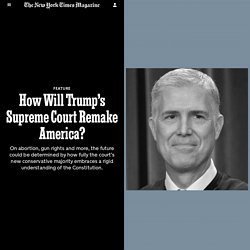
In the 2000s, Gorsuch represented Philip Anschutz, the oil-and-gas mogul, who has invested in a vast array of businesses and conservative publications, including The Washington Examiner. Anschutz played a role in elevating Gorsuch’s legal career. In 2006, after George W. Bush was re-elected president, Anschutz lobbied for Gorsuch’s appointment to the U.S. Court of Appeals for the 10th Circuit. Supreme Ambition excerpt: Kavanaugh’s fate came down to Susan Collins and Lisa Murkowski. Trump asks Supreme Court to shield his tax returns from prosecutors, setting up historic separation-of-powers showdown. Is the Supreme Court’s Fate in Elena Kagan’s Hands? The Supreme Court of the United States performs its duties with a theatrical formalism.

Every session opens with the Marshal of the Court, in the role of town crier, calling out “Oyez! Oyez! Oyez!” And “God save the United States and this Honorable Court!” Even when the nine Justices meet privately, once or twice a week, to discuss cases “in conference,” there is a rigid protocol. The writing of opinions has its own fine-grained traditions, and the slightest variation makes an impression. Last term, Kagan read from the bench a dissent in a case about partisan gerrymandering. Kagan, who is fifty-nine and was appointed by President Barack Obama, started her tenth term this October. Supreme Court allows families of Sandy Hook shooting victims to sue gunmaker Remington.
Current Members. Stephen G.
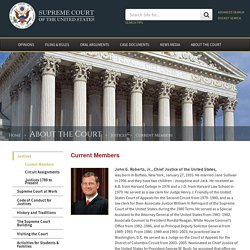
Breyer, Associate Justice, was born in San Francisco, California, August 15, 1938. He married Joanna Hare in 1967, and has three children - Chloe, Nell, and Michael. He received an A.B. from Stanford University, a B.A. from Magdalen College, Oxford, and an LL.B. from Harvard Law School. Concerns Raised Over FBI's Handling Of Brett Kavanaugh Allegations. SLAPP Suits: Last Week Tonight with John Oliver (HBO) How a case gets to the US Supreme Court. SCOTUS Cases You Should Watch Closely (HBO) Kavanaugh Hearing Cold Open - SNL. Brett Kavanaugh: Last Week Tonight with John Oliver (HBO) Supreme Court Says Judges Are Above Politics. It May Hear a Case Testing That View. Supreme Court precedents, the appeals court said, have drawn a line.

On the one hand, politics may play no role in the hiring and firing of most government workers. On the other, it is perfectly acceptable to consider politics for those in “policymaking positions.” In other words, it is unlawful to hire, say, prison guards or tow-truck drivers based on their political affiliations. But it is fine to consider politics in the appointment of officials who have a role in making policy like, say, prosecutors and public information officers.
Which side of the line do judges fall on? Judge Julio M. “Judges are not policymakers,” he wrote, “because whatever decisions judges make in any given case relates to the case under review and not to partisan political interests.” That was at odds with statements from other appeals courts, which may have taken a more realistic view of what judges actually do. Supreme Court's blockbuster term hits with LGBT, abortion, DACA and more. Last term, the justices -- five appointed by Republican presidents and four by Democrats -- tip-toed at times around controversial issues, they formed odd bedfellow alliances and largely avoided the bitter vitriol of the other two branches.
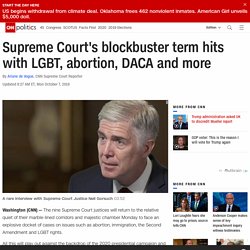
The Supreme Court Considers L.G.B.T. Rights, But Can’t Stop Talking about Bathrooms. On Tuesday, the Supreme Court heard oral arguments in arguably the highest-impact L.G.B.T.
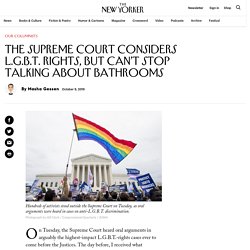
-rights cases ever to come before the Justices. The day before, I received what appeared to be a standard memo for members of the press who request a seat at a Supreme Court hearing: “The dress code in the press section is business attire (coat and tie required for men).” It said nothing about women’s clothing. It was almost funny. Will the Supreme Court Hand Trump Even More Power?
Faithful execution had a distinctive meaning in Anglo-American law at the time of the founding: It limited executive officers to acting only in the public interest and never for their own personal interest; it required subordination to law (which was most often legislation); and it mandated honest and diligent performance.
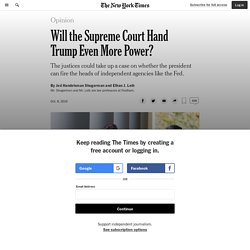
Together, this cluster of duties constrains the president with something similar to fiduciary duties. The “faithful execution” clause thus indicates that the president is already bound to remove someone only for good-faith reasons, in the public interest. So it must be constitutional for Congress to say out loud in a statute what is already commanded by the Constitution: Removal authority must be constrained because a president is never allowed to fire officers in bad faith. One might argue that “inefficiency, neglect of duty, or malfeasance in office” arguably goes beyond a constitutional good-faith requirement. Brent Budowsky: SCOTUS will affirm US v. Nixon. A Supreme Court Abortion Case That Tests the Court Itself. While ordinarily, plaintiffs in court cases lack standing to argue for the rights of those who are not parties to the case, the Supreme Court has permitted doctors to argue on behalf of women’s right to abortion ever since the immediate aftermath of Roe v.
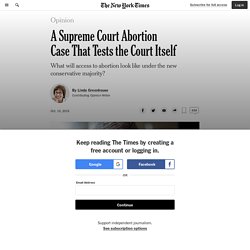
Wade. Doctors were involved in the early contraception and abortion cases as well, but back then they were in part arguing for their own freedom from prosecution. Once abortion became legal, the theory supporting what is known as third-party standing for doctors and clinics in post-Roe abortion cases is that there are too many obstacles of timing, resources and privacy for women to get to court to assert their own right to an abortion free of the regulatory obstacles that stand in their way.
Take away doctors’ right to advocate in court on their patients’ behalf and most legal attacks on state-created obstacles to abortion conveniently disappear. Of course, there’s so much wrong with that argument that the question is where to begin. What if the Supreme Court Had an L.G.B.T. Justice? Near the end of this year’s hit Broadway show “What the Constitution Means to Me,” the audience hears a scratchy old recording of an oral argument at the Supreme Court.
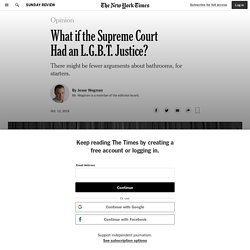
The year is 1965, and the justices are debating the topic of married women’s right to birth control. Or that’s the idea, anyway; for what feels like an eternity, the nine black-robed men do little but stammer and clear their throats. “Just listening to all those male voices deciding cases about female bodies, the absurdity of it hit me so hard,” Heidi Schreck, who wrote and performed the one-woman show, told me. “There was a gap in their ability to imagine lives that were very different from their own.” The scene was on my mind on Tuesday morning as I sat through oral arguments in a landmark trio of L.G.B.T. A Way Out for the Supreme Court on DACA.
Watch Out, America — The Supreme Court Is Back in Session. Still, this should be an easy case for the conservatives, who regularly profess their allegiance to the plain language of laws. If they are nevertheless inclined to read that language narrowly, they might heed the words of their hero, Justice Antonin Scalia, who wrote the opinion for a unanimous court in 1998 that Title VII applies to cases involving harassment between members of the same sex.
While Congress may not have been picturing such incidents in 1964, Justice Scalia wrote, “statutory prohibitions often go beyond the principal evil to cover reasonably comparable evils, and it is ultimately the provisions of our laws rather than the principal concerns of our legislators by which we are governed.” The Supreme Court could get a lot more undemocratic. Supreme Court: Last Week Tonight with John Oliver (HBO) (14) John Oliver - Justice Scalia.